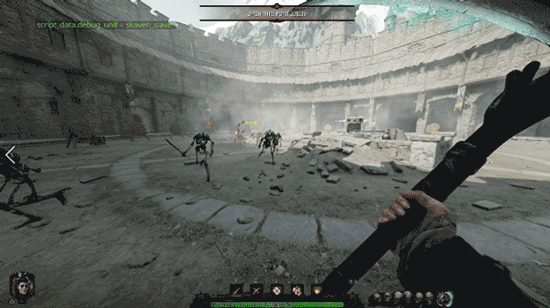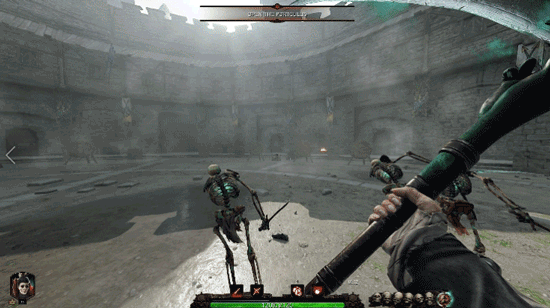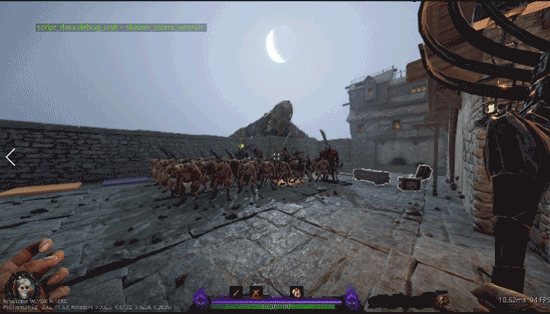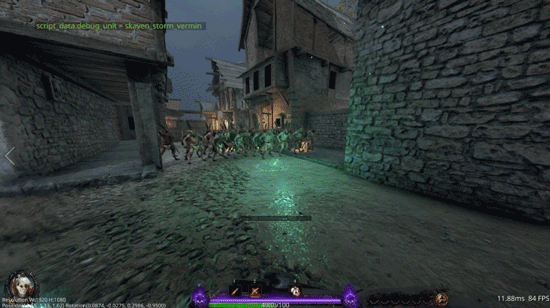Hello there, my name is Karl and I'm one of the designers on the v2 team. My task is to follow up our glorious leader's post on general necromancer production with some insight into some of the challenges and decisions we made on the gameplay level.-----

Creating a career starts with a fantasy plucked from the Warhammer universe that we want to translate into our game. Usually the fantasy gives you a hunch about what tools the career possesses, how it is going to play and what role it will fill. The Necromancer deviated slightly from this. We knew that she was going to summon skeletons and throw death magic around. How exactly she was going to play and what role she would fill was a bit more of a uncertainty as player minions as a concept was completely new.
Raised skeletons in Warhammer lore are not known to be the most kill-y unit. They serve as a vanguard to keep their master and their more important units safe. A replenishable undying frontline. We drew inspiration from this and decided that this is what Sienna's skeletons should achieve at a base level. A sorcerer summoning their own frontline.
To keep this post to a reasonable length I won't go into detail about every iteration that the skeletons and AI versus AI fighting went through. Every aspect about the skeletons saw intense iteration, aspects such as summoning, formation, combat, health and duration to mention a few. The skeletons bounced between being her career skill and passive multiple times but finally landed as the career skill at the center of the necromancer kit. 6 summonable Skeletons that engage enemies near Sienna.
 Process of tweaking aggro and leash range of skeletons when Sienna is not actively fighting.
Process of tweaking aggro and leash range of skeletons when Sienna is not actively fighting.As the skeletons grew into proper minions assisting Sienna in combat we could start to consider questions that a lot of summoner classes in games have to answer to. How are the minions tied into the second to second gameplay? Summoner control has two extremes with each their own audiences. One side being the micro intensive extensive control over the available minions, high skill floor and satisfying skill ceiling with a lot of expression. The other side is the more passive way where the summoner does little to impact the actual behavior of the summons but rather supports them with things like debuffs and control, letting their servants do the work for them. We wanted to place the Necromancer somewhere in between, allowing for some level of control to gain more from your skeletons without making it a barrier of entry to the career.
Without any player input the skeletons will stay near Sienna, attack nearby enemies and soak up enemy threats. To give players control (and tying in the skeletons in the second to second gameplay), we created three commands: attack, defend and release, granting players the ability to issue targets, reposition and even sacrifice their skeletal servants.
The nature of being a spell caster with 6 extra bodies around to soak enemy attention gave way to her two main roles. A backline spell caster using her personal frontline as a buffer while dispensing death and a control focused summoner utilizing the great threat soaking potential of minions to grant the party breathing room. This we felt slotted into the Sienna career lineup.
 To reduce vision blocking when controlling a lot of skeletons only 4 are forced to move in formation in front of Sienna.
To reduce vision blocking when controlling a lot of skeletons only 4 are forced to move in formation in front of Sienna.Regarding her weapons, one side was already solved. The Scythe, a staple to necromancers in any rpg and Sienna's first proper two handed weapon. Great weapons with great cleaves are nothing new to Vermintide and Sienna was missing out on the fun.
The Soulstealer Staff required a bit more pondering. Here the challenge was to find gameplay in the form of spells that were different from her other staves but still befitted the Warhammer lore of necromancy. The staff saw many iterations and we decided on the flavorfully on point soul drain which is slow but tackles even the biggest of brutes. Building on the theme of control we also gave the staff a haunting curse allowing the necromancer to keep multiple elites under control as they are brought low by her Necromantic magics and servants.
 Trying out the Soulstealer Staff with the “Cursed Blood” talent.
Trying out the Soulstealer Staff with the “Cursed Blood” talent.To go along with her weapons and calcium crew, Sienna's main passive Malediction of Nagash causes her Necromantic magics to increase the damage the enemy suffers from her. The intent behind this passive is to transform Sienna's damage over time effects into a way to enable other parts of her kit whilst also tying in the fantasy of necromantic magics draining enemy vigor.

Which brings us the Necromancer’s talent tree. The main purpose of the Vermintide talent trees is of course offering different ways to play the career within its allotted gameplay space, but also to extend the career into more specialized versions of the power fantasy. The challenge then is to provide the players relevant options for specialized playstyles that slots appropriately into the lore. The identities we selected that would serve as guidelines were summoner, caster and melee.
The summoner works with their undying servants and their talents affect skeleton numbers, strength and how often they can be summoned. Suggested talents for a summoner build.
- Vanhel’s Danse Macabre: Sienna gains 12% attack speed when 4 or more Skeletons are raised.
- Spirit Leech: Killing an elite enemy restores 15% cooldown.
- Army of the Dead: Raise Dead now causes Skeletons to remain for 20 seconds before decaying.
The caster sees their skeletons as shambling batteries of magic to be used as sacrificial pawns in their flurry of magical spells, their talents affect ranged power, overcharge management and damage over time effects. Suggested talents for a caster build.
- Death Ascendent: Casting spells grants 5% increased Ranged Power for 6 seconds. Max Stacks 5.
- Lost Souls: Venting 20% Overcharge unleashes a soul that steals health from a nearby enemy, restoring 2 temporary health.
- Barrow Blades: Skeletons now carry two cursed blades. When raised, and when attacking, they ignite enemies, causing damage over time.
The melee fantasy is for necromancers who prefer to utilize their instruments of death at close range, their talents affect melee prowess, control and survivability. Suggested melee build talents.
- Reaping: Critical strikes have Unlimited Cleave and 25% increased Power.
- Soul Harvest: The Malediction of Nagash rips the soul from targets that die. Harvesting 8 souls causes the next attack to be a guaranteed Critical Hit.
- The Curse of Undeath: Casting Raise Dead reduces damage inflicted on Sienna by 80% for the next 3 hits.
-----
While the goal is to create talents that enhance the tools and feeling of a specialized build, the aim is to create talents that don't pigeon-hole players too much and are useful on their own to allow for tinkering and mix-and-matching.
So whether it is halting the enemy advance with shambling walls of bone, shriveling the enemies life essence or swinging big scythes around we hope that you will enjoy bringing death to the enemy in one way or another and we look forward to your response on the necromancer. As we pick up on our efforts to balance and evolve the game, we will keep a close eye on the numbers as the necromancer and her bad to the bone crew of restless dead enter the fray.




